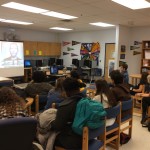
That’s why, she says, she gets invited to speak about the Islamic State (ISIS), Charlie Hebdo, the French cartoonist who was shot last year, and free speech. It does not matter that her expertise is in Sufism, not in ISIS or the militancy and insurgency of the Middle East.
Her only qualification seems to be that she has a Ph.D. in Islamic Studies.
Steinfels notes that when fundamental Buddhists in Myanmar began to persecute the Muslim minority, the Rohingya, no one asked Buddhist scholars to speak about the aspect of Buddhism that might condone such atrocities. “Would a professor of Buddhism, regardless of the particular place, time, and tradition of her expertise, be the right person to comment?”
How did Steinfeils respond to the speaking request? Since it was from students, and not the media, she accepted, stating first that,
I simply did not know how relevant religion was in understanding military conflicts. To what extent are ISIS’s stated religious aims genuine, to what extent are they propaganda, to what extent are they distractions from other, more material, goals?
All of us who teach about Islam have to come to terms with such requests and make our own choices in how to meet them, even though many of us were not trained as experts in contemporary and political formations of the religion.












